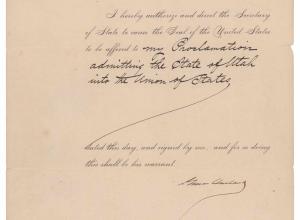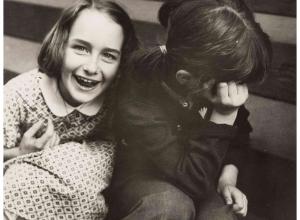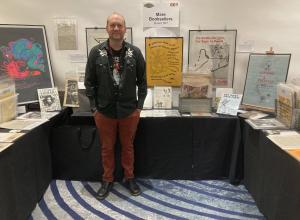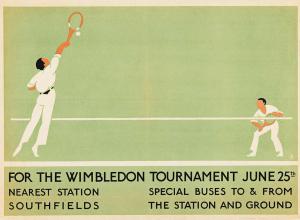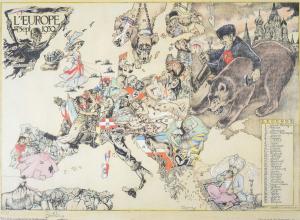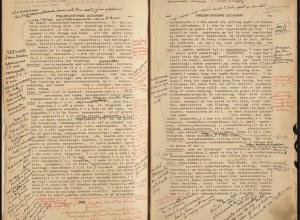Papers of Virtuoso Violinist Roman Totenberg Now Online
The Library of Congress has launched a new online presentation of 130 items documenting the life and career of virtuoso violinist and revered teacher Roman Totenberg (1911-2012).
The presentation—drawn from his personal papers, which were a gift to the Library from the Totenberg family—includes photographs, correspondence, video interviews, concert programs, publicity material and solo violin parts from core repertoire with Totenberg’s personal performance annotations. There is also a separate presentation of 61 woodblock prints, drawings and watercolors drawn from the Totenberg Papers that were created by his friend, Russian-born artist Ilka Kolsky.
"Roman Totenberg’s career as an orchestral soloist and chamber musician as well as a renowned teacher was remarkable for its variety—the music he performed, the venues where he appeared, the musicians with whom he collaborated, the students he taught—and for its phenomenal longevity," said Susan Vita, chief of the Library’s Music Division. "The online presentation samples the treasures in the Roman Totenberg Collection, giving a fascinating view of the distinguished Polish-American violinist. The Totenberg Papers are part of the Library’s important violin-related collections which also include the papers of Fritz Kreisler, Jascha Heifetz, Josef Gingold and Isaac Stern, among others. The Music Division plans to expand its online violin presence in the coming years to draw attention to the wealth of potential research material in our collections."
Totenberg, who was born on Jan. 1, 1911 in ?ód?, Poland, enjoyed an extraordinarily long and varied career, spanning nine decades and four continents. He made his debut as a soloist with the Warsaw Philharmonic at age 11 and performed his last concert when he was in his mid-90s. He was still teaching at age 101, shortly before his death in May 2012.
He moved as a child with his family to Moscow, where he first studied the violin and witnessed firsthand the Russian Revolution. He continued his studies in Warsaw as a teenager, followed by study with Carl Flesch in Berlin and Georges Enescu in Paris. In 1935, he made his U.S. debut with the National Symphony Orchestra in Washington, D.C. Having established himself internationally, in 1938 he chose to immigrate to the United States under the distinguished artist visa program. Soon after, he went to extraordinary lengths to aid family and friends trapped in Poland during World War II and the Holocaust.
Totenberg served as the director of chamber music at the radio station WQXR in New York and as first violinist of the WQXR Quartet from 1940 to 1942. Later, he performed as the founding violinist of the Alma Trio, collaborating with the group from 1948 to 1951. While continuing to perform as a soloist internationally, Totenberg established a distinguished legacy as a pedagogue, teaching at the Peabody Conservatory, the Mannes College of Music, the Music Academy of the West, the Aspen Music Festival, Boston University, Tanglewood, Kneisel Hall and the Longy School of Music. He maintained an extensive repertoire and championed many compositions of his contemporaries, including works by Karol Szymanowski, Darius Milhaud, Paul Hindemith, Samuel Barber, Aaron Copland, Arnold Schoenberg and William Schuman.
After Totenberg died, his family donated his papers to the Library of Congress. He is survived by his daughters Nina Totenberg, the NPR legal affairs correspondent; Jill Totenberg, CEO of The Totenberg Group, a corporate communications firm; and federal Judge Amy Totenberg. His wife of 56 years, Melanie (née Shroder) Totenberg, died in 1996.
Future additions to the online presentation will include audio recordings of Totenberg in concert, featured articles and a special release of vital materials related to the Totenberg family during the Holocaust.
The Music Division at the Library of Congress contains an unparalleled collection of manuscripts, scores, sound recordings, books, libretti, music-related periodicals and microforms, copyright deposits and musical instruments. Manuscripts of note include those of European masters such as Bach, Mozart, Beethoven and Brahms, and those of American masters such as Aaron Copland, Samuel Barber, Leonard Bernstein and Charles Mingus. For more information about the division’s holdings, visit loc.gov.





